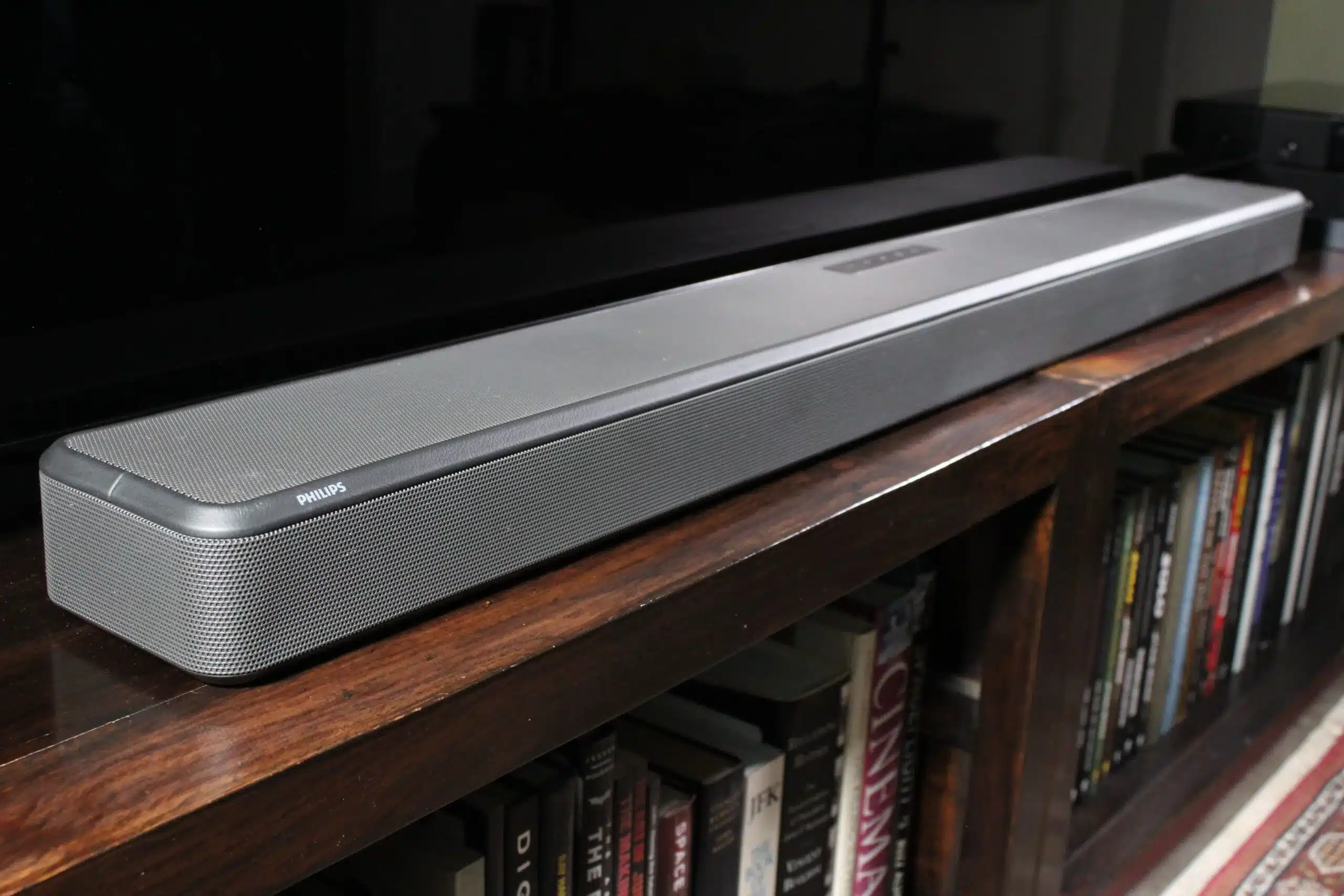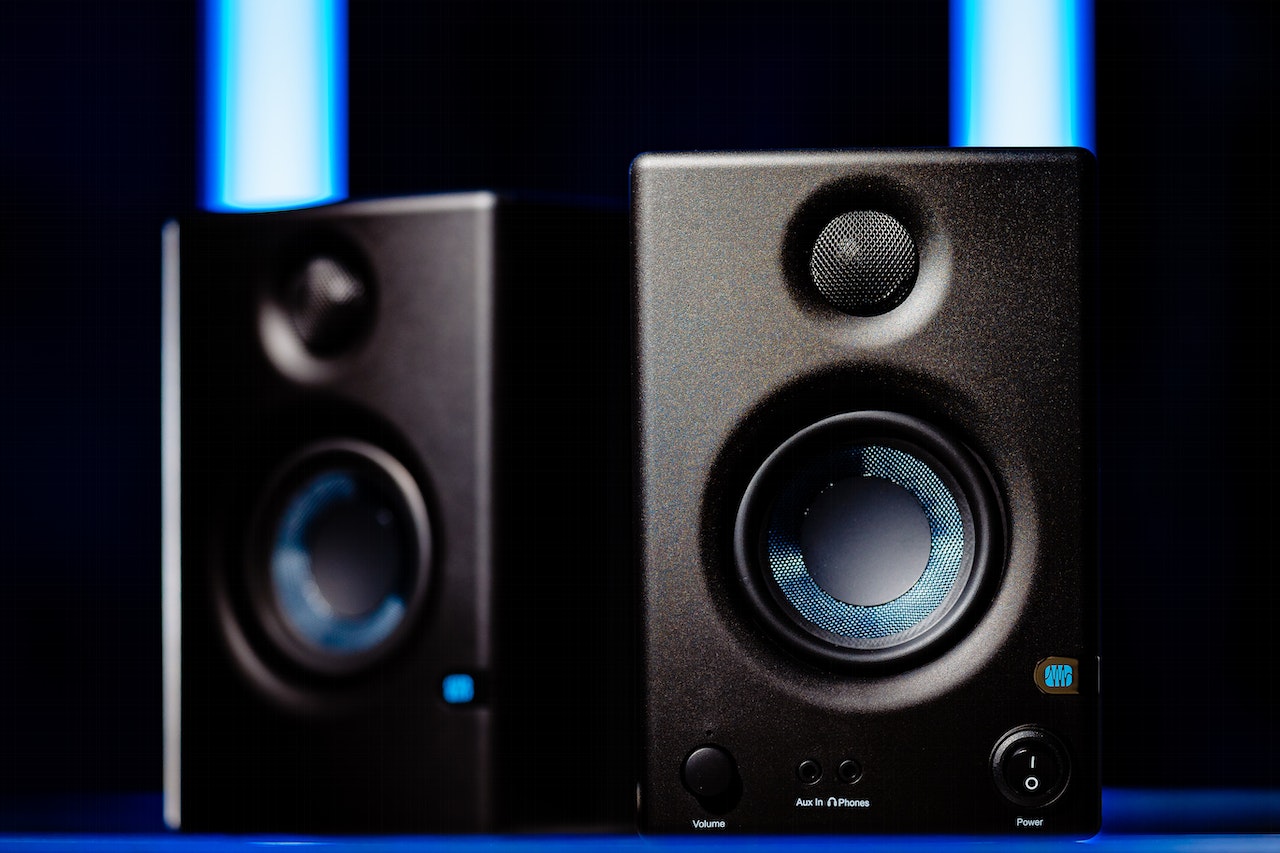Delving into the world of home audio systems can be an overwhelming experience, especially with the vast array of products in the marketplace. One of the most pivotal questions in this exploration is whether to opt for a soundbar or dedicated speakers. This comprehensive guide will help you navigate these waters, offering a detailed understanding of these two options, their benefits, drawbacks, and everything in between.
In the realm of audio equipment, a soundbar is a specialized type of speaker that projects audio from a wide enclosure. It is typically designed with an elongated, rectangular form to mirror the width of your television, creating an aesthetic symmetry in your setup.
Unlike traditional speakers, which consist of separate units, a soundbar encapsulates multiple speaker components within its structure. The design typically includes a variety of speaker types, such as tweeters, subwoofers, and mid-range drivers, all housed within one sleek bar. This not only conserves space but also enhances the aesthetic appeal of your setup by reducing clutter.
In addition, many soundbars come with a subwoofer — either built into the unit or as an external component. The role of this device is to reproduce low-pitched audio frequencies, also known as bass and sub-bass, which enrich the depth and fullness of the sound produced.
 Soundbar: Pros and Cons
Soundbar: Pros and ConsWith their growing popularity in recent years, soundbars have become a go-to alternative to traditional speakers for many households. However, like any product, they come with their set of advantages and disadvantages.
With the ongoing trend of manufacturing increasingly slim televisions, the sacrifice has often been the quality of built-in audio. This is where soundbars step in, offering a remarkable enhancement in sound quality despite their compact form.
Soundbars are engineered with advanced technologies such as digital signal processing (DSP) and various forms of sound enhancement techniques that boost the audio output, often providing a richer, fuller sound than your TV’s native speakers. This can greatly enhance your viewing experience, making it an attractive option for those seeking an immediate and significant upgrade.
One of the most prominent advantages of a soundbar is its compactness. Its slim, unobtrusive design can be conveniently placed under the television, making it an excellent choice for smaller rooms or spaces with limited room for speaker placement.
Furthermore, the all-in-one soundbar design means that it takes up significantly less space compared to a surround sound speaker system. This is particularly advantageous for those prioritizing a clean, minimalist aesthetic in their living space.
Unlike traditional speaker systems, which require individual wiring for each speaker, a soundbar can be connected to your television with just one wire. This simplicity makes it much easier to set up and reduces unsightly wire clutter. Wireless options are also available, eliminating the need for any physical connection to your television.
Soundbars are available at various prices, with options to suit all budgets. Generally, they tend to be more affordable than full-fledged speaker sets, making them an excellent option for those seeking to enhance their audio experience without breaking the bank.
Despite their many advantages, soundbars are not without their limitations. Due to their design’s physical constraints, they cannot provide the same degree of audio immersion as a dedicated speaker system.
While many soundbars employ technologies to mimic surround sound, the reality is that sound emanating from a single location cannot compete with the spatial distribution of sound from multiple speakers. As such, those seeking a home audio system primarily for movie watching or gaming might want to consider a dedicated speaker system for a more immersive experience.
On the other hand, a set of dedicated speakers offers an entirely different audio experience. Also known as a component speaker system, this setup consists of multiple individual units, including a combination of woofers, subwoofers, and tweeters. Each speaker is designed to produce specific frequencies, which deliver a wide spectrum of sound when combined.
Most basic speaker setups consist of a pair of stereo speakers and a receiver. However, for an even richer audio experience, additional components such as a subwoofer for low-frequency sounds and additional speakers for surround sound can be added.
 Dedicated Speakers: Pros and Cons
Dedicated Speakers: Pros and ConsDedicated speaker systems have long been the standard in home audio, offering superior sound quality and the ability to customize your setup. However, they do come with their own set of considerations.
A well-configured set of speakers is hard to beat when it comes to pure audio quality. The spatial separation of sound that comes with multiple speakers offers a level of audio immersion that a soundbar cannot replicate.
This is particularly true when it comes to surround sound setups. A 5.1 system, for example, consists of five full-bandwidth channels and one low-frequency effects channel (the “.1” in the configuration). This results in a sound that doesn’t just come from the front of the room but all around you.
One of the biggest advantages of a dedicated speaker system is its upgradeability. You can start small with just a pair of speakers and a receiver and gradually add more components over time. This allows you to spread the cost and continuously enhance your audio setup to match evolving technologies and your preferences.
Dedicated speaker systems offer significantly more flexibility than soundbars. You can choose to replace a specific component, add more speakers, or adjust the placement of your speakers to fine-tune the sound to your liking.
While dedicated speakers offer superior sound, setting them up can be a complex task requiring a certain degree of audio knowledge. From deciding where to place each speaker for optimal sound to running wires and configuring settings on a receiver, the setup process can be daunting for some.
With their various components, dedicated speaker systems can take up considerable space. In addition to requiring enough room for speaker placement, you’ll also need to manage the wiring for each component, which can add to the clutter.
An often-asked question is whether one can use a soundbar and speakers together. While it is technically possible in certain setups, it’s not typically recommended due to the potential for audio conflicts and complexities in the setup process. Most soundbars are designed to operate independently and provide a complete sound solution independently.
The decision between a soundbar and dedicated speakers largely hinges on your individual needs and circumstances. A soundbar would be a worthy contender if you are constrained by budget, space, or a preference for simplicity. Its ease of setup, affordability, and sleek design make it an excellent choice for enhancing your television’s audio without the complexity or expense of a full speaker system.
Conversely, if your priority is to achieve the highest possible sound quality and you have the budget, space, and technical know-how, a dedicated speaker system would be the way to go. With the ability to provide a more immersive and nuanced audio experience, and the flexibility to upgrade and customize your setup, it’s the preferred choice for audio purists.
Ultimately, both soundbars and dedicated speakers have their strengths and drawbacks. Understanding these can help you make a well-informed decision, ensuring the best audio experience tailored to your specific requirements. Enjoying your favorite shows, movies, or music with high-quality sound can dramatically enrich your home entertainment experience — and that’s music to anyone’s ears.
Making an informed decision between a soundbar and a dedicated speaker system will depend on assessing your unique needs and circumstances. It’s crucial to balance your audio requirements, spatial constraints, budget, and technical acumen to select the ideal audio solution for your home.
To begin with, consider what you primarily use your audio system for. A soundbar may provide ample sound enhancement to suit your needs if you mostly watch TV, stream services, or listen to casual music.
On the other hand, if you’re a cinephile who enjoys experiencing films in high-definition audio, an avid gamer seeking an immersive gaming experience, or an audiophile who values superior sound quality, a dedicated speaker system would be a more fitting choice.
The size and layout of your room can significantly impact your choice of audio system. With its compact and sleek design, a soundbar can be a suitable choice for small rooms, apartments, or any living area where space is at a premium. It can neatly fit under your TV or be wall-mounted, saving space and reducing clutter.
Conversely, a dedicated speaker system requires considerably more space. Each speaker needs to be placed strategically around the room for optimal sound distribution, which might be challenging in smaller spaces. However, a multi-component speaker system can provide an unmatched immersive audio experience for larger rooms or dedicated home theater setups.
Cost is another essential factor to consider. Soundbars are generally more affordable than speaker systems, with some models offering excellent sound quality at a reasonable price point. If you’re on a budget but still desire a significant improvement in your TV’s audio, a soundbar is an economical choice.
On the other hand, a dedicated speaker system, while typically more expensive, can offer superior audio performance. It’s worth noting that a speaker system can also be a long-term investment. You can start with a basic setup and progressively add components over time, spreading out the cost.
Finally, consider your comfort level with setting up and calibrating audio equipment. Soundbars are relatively straightforward to install and operate, typically involving a simple connection to your TV and a few settings adjustments.
Setting up a dedicated speaker system is more involved, often requiring careful speaker placement, cable management, and system calibration. If you’re not averse to a bit of a technical challenge and enjoy fine-tuning your audio experience, a speaker system would be an ideal fit.
Choosing between a soundbar and dedicated speakers depends on your personal needs and preferences. Both options offer their unique advantages and potential drawbacks.
A soundbar significantly improves your TV’s built-in speakers in a compact, stylish, and easy-to-set-up package. Its sound quality and spatial audio effects are continually improving, offering a rich audio experience for most users.
In contrast, a dedicated speaker system offers unmatched sound quality and immersion, particularly for surround sound configurations. Its flexibility and upgradability make it a worthwhile long-term investment for audio enthusiasts.
By assessing your needs and preferences regarding audio quality, space, budget, and technical expertise, you’ll be well-equipped to make the best choice for your home audio system. Remember, the best system for you is the one that most effectively enhances your enjoyment of your favorite shows, movies, music, and games. Enjoy the process of choosing and setting up your new audio system – the reward will be a dramatically improved home entertainment experience.